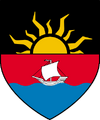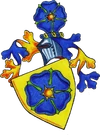Nazair is situated just south of the Amell Mountains, through which the Slopes and Riverdell can be reached via the Theodula Pass. North of Nazair lie Cintra and Upper Sodden, to the east is Mag Turga, the river Yelena borders the province to the south, and to the west is the Great Sea.
It was a kingdom around 1232 but then conquered by Nilfgaard, becoming a province of the empire. After Nilfgaard conquered the land, a big uprising raised, trying to kick the black ones out. Major General Markus Braibant sent there a unit commanded by Dacre Silifant and Ola Harsheim to calm the rebellion: the thing ended in a bloody massacre.
Heraldry
Coat of arms
The coats of arms for Nazair are not actually described in the novels. First particular coat of arms was designed by our resident heraldry and Witcher expert Mboro. The current is inspired by the Czech concept (the drawing) and designed by Juraj103 and might be considered as its crest before Nilfgaard took over.
Flag
The flag for Nazair is never actually described in the novels. Current flag is based on the Czech concept.
Notable cities, keeps and castles
- Assengard
- Rhys-Rhun
Landmarks
- lake Muredach
Notes
- Nazair is famous for its blue roses, with a faint purple shade at the tips of the petals. Nivellen's grandfather brought seedlings to grace the yard of their manor.
- The region is also famous for its silver mines and for the skills of the local artisans, specialized in the production of refined silver vases.[2]
- Nilfgaard conquered Nazair during the wars. It was known for its fierce resistance to the occupation and many uprisings.
- It known to be the only area where a rare mineral, cinnabarite, is found, and which is used to dye their inks.[1]
Trivia
- In the Blood and Wine expansion for The Witcher 3: Wild Hunt, during Capture the Castle, the Nazairi soldiers use a great number of Dutch profanities; this includes rotzak ("scumbag"), schijtlijster ("coward"), stront ("shit") and piemellikkers ("cocksuckers"). They also use the word kusse, later explained by Regis to refer to a vagina. This is akin to Dutch kut and its older form kutte, which carry the same meaning (though kusse is more likely from Danish, where it means "pussy"). Most if not all of these words are very likely Nilfgaardian.


